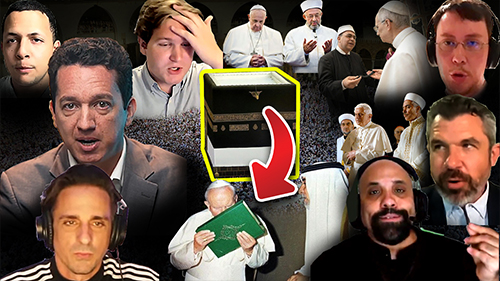| Recent Featured Videos and Articles | Eastern “Orthodoxy” Refuted | How To Avoid Sin | The Antichrist Identified! | What Fake Christians Get Wrong About Ephesians | Why So Many Can't Believe | “Magicians” Prove A Spiritual World Exists | Amazing Evidence For God | News Links |
| Vatican II “Catholic” Church Exposed | Steps To Convert | Outside The Church There Is No Salvation | E-Exchanges | The Holy Rosary | Padre Pio | Traditional Catholic Issues And Groups | Help Save Souls: Donate |  |









 " />
" /> " />
" /> " />
" /> " />
" /> " />
" />




Objection 11): What does it matter whether or not Benedict XVI/Francis is a pope? The issue does not concern me.
Answer: If whether or not Benedict XVI is a pope does not matter, then the non-Catholicism of the Vatican II sect does not matter, the New Mass doesn’t matter, etc. One cannot separate one from the other. You cannot separate pope and Church. Furthermore, to maintain that Benedict XVI is the head of the Catholic Church is to assert that the gates of Hell have prevailed against Her.
Further, to obstinately recognize Benedict XVI as the pope is to commit a sin against the Faith; for it is to assert that one has the true Faith who, in fact, is a manifest heretic and apostate against it. Moreover, to recognize Benedict XVI and the other Vatican II antipopes as true popes is to scandalize non-Catholics; it is to be unable to consistently present the Faith to a non-Catholic. On this point, we must now see The Devastating Dilemma to demonstrate just how much this issue matters.
The Devastating Dilemma: Why Catholics cannot even present the Faith to a Protestant if they accept the Vatican II antipopes as true popes
Suppose that tomorrow you encounter a well-informed Protestant who is interested in becoming a Catholic. While this man claims to be interested in becoming “Catholic,” he has major problems with the teaching of the Catholic Church on justification: he rejects the canons and decrees of the 16th century Council of Trent. As he explains his position you think to yourself: “How does this man expect to become Catholic when he doesn’t believe in the teaching of the Council of Trent on justification?”
So you, being a charitable Catholic, inform him that if he wants to become Catholic he must accept and believe the Council of Trent’s teaching on justification and repudiate Luther’s view of justification by faith alone (sola fide), since the Catholic Church (not to mention scripture – James 2:24) condemns the idea of justification by faith alone.
But the Protestant responds by saying:
#1) The Protestant first cites the Joint Declaration with the Lutherans on the Doctrine of Justification, approved by the Vatican on Oct. 31, 1999. He quotes two selections from the Joint Declaration with the Lutherans on the Doctrine of Justification, which he happens to have in his briefcase.
After citing this, the Protestant correctly explains that this rules out any condemnation of the Lutheran view of justification (faith alone, etc.). He then cites # 13.
After citing this, the Protestant rightly explains that this also means that Trent’s condemnations (in the 16th century) of the Lutheran view of justification no longer apply.
#2) To further substantiate his point, the Protestant proceeds to cite two more selections from the same Joint Declaration With the Lutherans.
The Protestant points out the obvious fact that this means that none of the Lutheran teaching contained in the Joint Declaration is condemned by the Council of Trent. He then proves that justification by faith alone is among the teaching of the Lutheran churches in the Joint Declaration.
He concludes, with perfect logic, that according to the Vatican’s own agreement with the Lutherans on justification, faith alone is most assuredly not condemned by the Council of Trent. Thus, he says to you:
#3) Finally, this smart Protestant knows that you will try to say that John Paul II and Benedict XVI didn’t sign the Joint Declaration with the Lutherans on the Doctrine of Justification. So he points out that the Joint Declaration was signed under John Paul II’s auspices and repeatedly approved by Benedict XVI.
John Paul II, Jan. 19, 2004, At a Meeting with Lutherans From Finland: “… I wish to express my gratitude for the ecumenical progress made between Catholics and Lutherans in the five years since the signing of the Joint Declaration on the Doctrine of Justification.”[6]
The Protestant concludes his presentation by saying:
You know that as a Catholic, you have a strict obligation to tell him that belief in faith alone and belief in the Catholic religion are incompatible. So what do you say in response?
If you hold that Benedict XVI and John Paul II are/were valid popes, you spit back the following response, which is the only thing that you can think of:
And the smart Protestant, quickly detecting the flaws in this illogical and poor response, replies:
If you hold that Benedict XVI is a valid pope, you would then have nothing to say in response to this Protestant. The debate is over, and you have lost. You cannot on the one hand say that acceptance of faith alone and the Joint Declaration With the Lutherans on the Doctrine of Justification is incompatible with this Protestant’s entrance into the Catholic Church (which you must as a Catholic, since this was defined infallibly at Trent), while you simultaneously give obedience to Benedict XVI as head of the Catholic Church, who has demonstrated his acceptance of the Joint Declaration with the Lutherans on the Doctrine of Justification quite publicly. The Protestant has cornered you and you are forced to admit that he can indeed become Catholic and hold to what is taught in the Joint Declaration. This proves that those who accept Benedict XVI as the pope cannot even consistently present the Catholic Faith to a Protestant. THEY MUST ADMIT THAT ONE CAN BE A “CATHOLIC” AND HOLD THAT FAITH ALONE IS NOT AN ANATHEMATIZED HERESY, AND THAT TRENT’S CANONS DO NOT APPLY TO THE LUTHERAN VIEW OF JUSTIFICATION.
As long as one acknowledges Benedict XVI as the Catholic pope, he is defending a Church that has repudiated the Council of Trent, a “Church” that is, by definition, a non-Catholic Church – a Church of heretics.
The same judgment and authority by which you determined that this non-denominational Protestant was a heretic and outside the Catholic Church – a judgment you made upon meeting him and finding out what he believed and how he repudiated the Council of Trent – is the same exact judgment that you absolutely are forced to make about Benedict XVI. It should hit you in a striking and illuminating way that you are not guilty of judging the Holy See or a pope when you correctly judge that Benedict XVI is a non-Catholic; rather, you are identifying a non-Catholic for what he is, just as you correctly identified the non-denominational Protestant you met as a non-Catholic, as well as any Calvinist, Methodist or Episcopalian.
See other Answers to the Most Common Objections Against Sedevacantism
[1] Decrees of the Ecumenical Councils, Vol. 2, p. 675.
[2] L’Osservatore Romano, Special Insert, Joint Declaration of the Doctrine of Justification, November 24, 1999, #5.
[3] L’Osservatore Romano, Special Insert, Joint Declaration of the Doctrine of Justification, November 24, 1999, #13.
[4] L’Osservatore Romano, Special Insert, Joint Declaration of the Doctrine of Justification, November 24, 1999, #41.
[5] L’Osservatore Romano, Special Insert, Joint Declaration of the Doctrine of Justification, November 24, 1999, #26.
[6] L’Osservatore Romano, Jan. 28, 2004, p. 4.
[7] L’Osservatore Romano, Dec. 21/28, p. 5.
[8] Denzinger 423.
Sign up for our free e-mail list to see future vaticancatholic.com videos and articles.
Recent Content
^